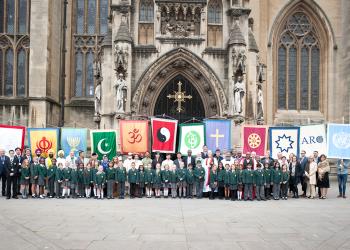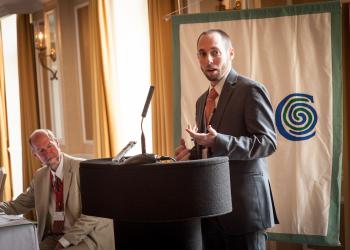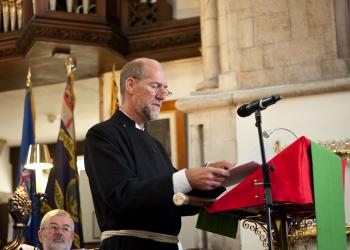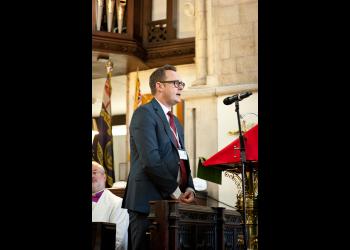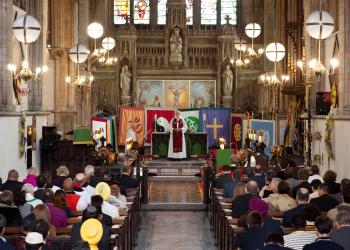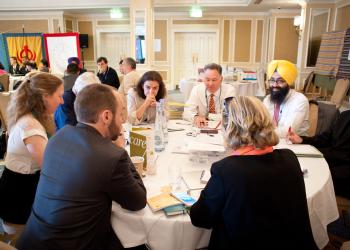Religious communities develop action plans for Agenda 2030
Representatives of the world’s major religions, including the Baha’i Faith, have offered to the United Nations a series of action plans and other contributions in support for the proposed Sustainable Development Goals (SDGs), the UN’s primary development agenda for the next 15 years.
The plans, called the Bristol Commitments, were presented and discussed at a pageant-trimmed, two-day event held here 8-9 September 2015, which was co-hosted by the United Nations Development Programme (UNDP) and the Alliance of Religions and Conservation (ARC).
The plans include specific pledges to develop microcredit programs for the poor, increase access to education, plant trees, invest in clean energy and green pilgrimage. These “practical pledges” were offered alongside the overarching efforts that faith communities make every day to fight poverty, provide education, and promote environmental stewardship.
“The Bristol Commitments are specific, faith-related, detailed programs of work by faith communities from around the world,” said Martin Palmer, ARC secretary general.
Mr. Palmer also said activities to promote sustainable development are not new to religious communities. “They have been working on many aspects of the SDGs for centuries, whether that’s feeding millions of people, caring for them through schools, managing the land, or simply seeking to be a compassionate presence in a world that for many is extraordinarily tough,” said Mr. Palmer.
The SDGs are a set of 17 development goals scheduled to be adopted by world leaders at the UN on 25 September in New York. Also known as Agenda 2030, the goals promise a broad, universal approach to ending poverty, protecting the environment, and improving education and gender equity worldwide.
Paul Ladd, director of UNDP’s team on the post-2015 development agenda, formally accepted the Bristol Commitments from the faith communities on behalf of the UN.
“More than 80 percent of the world’s people express a religious affiliation,” said Mr. Ladd. “Knowing this, it becomes clear that the UN needs to work closely with faith communities over the next 15 years if the new global goals for sustainable development are to be achieved.”
A common theme
One common theme that emerged from the discussions in Bristol was the important role of individual and community-level actions in efforts by faith groups to assist in meeting the SDGs.
“We can all think of examples where the central figures of our faiths have changed hearts, minds, and lives – the course of history – through seemingly small actions,” said Daniel Perell, a representative of the Baha’i International Community to the United Nations.
“It is these small actions, endowed with purity of motive that, in the aggregate, will change the world. We have the opportunity now to commit ourselves to a global, universal endeavor, agreed upon by the nations of the world. We can take this good start and make it transformational.”
Tomoski Takahasi, for example, told of a project undertaken by the Shinto community of Japan to plan trees and create a “Great Forest Wall” to protect against future tsunamis. “So much of the discussion about the SDGs has been about ‘How much will they cost?’” he said. “The Great Forest Wall costs almost nothing – mainly the cost of raising seedlings and transporting them to the site.
Nathan Kyamanyara, an Anglican bishop from Uganda, said his diocese is already involved in a number of small scale projects that directly address the SDGs. These include community efforts at tree planting, a coffee plantation, and a youth project to make fuel pellets from garbage.
In addition to such speeches, many of the faith communities at the meeting contributed papers to a soon-to-be published book that will encapsulate and elaborate on how religions will contribute to Agenda 2030.
The Baha’i contribution
In its contribution to the book, the Baha’i International Community stressed efforts of the worldwide Baha’i community to promote a global program of capacity building designed to enable “people of all backgrounds to participate in the transformation of society.”
That program, which operates in thousands of localities around the world, is organized around the principle of learning, and it addresses three stages of life: children, young adolescents, and older youth and adults. Its overarching message is one of service, and its mode of empowerment is one of consultation and joint study.
Local classes or study groups developed through this program “help participants to analyse and understand the constructive and destructive forces operating in society, to recognize the influence these forces exert on their thoughts and actions, and to take constructive, principled action in response.”
While not aimed directly at addressing the SDGs, many of the projects that naturally emerge from these activities do and will meet a number of the goals of Agenda 2030, said the paper.
“Individuals in a given community might, in response to local challenges and available resources, choose to study a course in public health, gaining skills related to the aims of SDG 3,” notes the Baha’i book chapter.
“A group of rural farmers might collectively choose to pursue a course in sustainable agriculture, thereby contributing to SDG 2 on hunger and food security. And of course the educational process as a whole, providing both content and training in child and adult education, is a powerful tool for pursuing the objectives of SDG 4 on inclusive education and lifelong learning,” said the contribution.
For more on the conference, or to read all of the Bristol Commitments, visit Arcworld.org
[Note: all photos accompanying this article are courtesy of ARC.]
